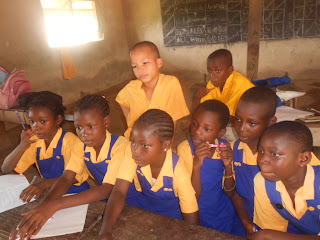I cannot haggle with cab drivers. I end up tipping them
instead. This patient good-natured cabbie waited while the Divine Miss Larissa
used an old-style swipe gadget to process my credit card. Then he waited while
she was put on hold when calling the bank for authorisation. And then he waited
some more when I dashed to two cash machines en route to Kaneshai Station.
Besides, he has three teenage daughters to put through school. He deserves a
few extra cedis for his trouble!
Pastor Charles had told me that Ghanaians are renowned for
their friendliness and kindness. This is very true and I would add honesty and
trustworthiness to the list of good qualities. Their strong Christian values
permeate transactions.
The hawkers with their heads piled with dubious snacks who
swarm the departing tro tros never persist or badger when you say ‘No’. And
traders politely give you the correct change, despite how tough it is to earn a
few bucks here. Stallholders are scrupulously honest, not full of trickery, up
selling and cross selling, like in some dog eat dog cultures. And Ghanaians are
funny, constantly joking, enjoying the moment. Always smiling! (except when you
point a camera and they go all solemn!)
The squashed passengers bump along in companionable silence,
with Reggae music creating a happy mood. A large pleasant woman presses against
me but at least I rescued my laptop from my battered green duffle bag the guy
was shoving under her seat with great gusto. The image of my cracked Apple Mac
makes me shudder.
I am truly on my own now, travelling solo as the only
pale-faced, bleached blonde middle-aged woman amongst a van jam-packed with
Ghanaians who know where they’re going. It is Sunday, July 1st, the
start of the third week of my adventure when I am free to go sightseeing. I’m
on my way to Elmina, a must-see destination in the Bradt tourist guild book.
I haven’t booked a room at the Coconut Grove Bridge House. I
couldn’t get through on the phone number. After several failed attempts I gave
up and surrendered to the NOW! I’m trusting, like Joseph and Mary, that I’ll
eventually find somewhere to shelter tonight!
The rocky two-hour journey is cramped and awkward on the
back seat as my sore bum registers every pothole and puddle. The large lady and
I grimace as we bounce up and down and stare through the rain-smeared windows
passing poor shantytowns, rural slums, of dilapidated shacks and imposing
half-finished houses, abandoned dreams, decaying in long grass.
As the trusty tro tro finally approach Elmina, we pass
cheerful little timber stalls with names such as Mama Grace, Mama Lucy, Mama
Monica painted in bright letters. I’m looking for the produce on sale but
there’s hardly an old cabbage in sight. The poverty is palpable and I’m filled
with sadness.
I am hoping for an escape in a luxurious resort but my
fantasies are dashed.
The only USP of the rough brick Coconut Grove Bridge House
is its location, smack in the middle of the historic town, right next to the
infamous castle.
When the porter opens the door, my nostrils are assaulted by
a musty smell. The air conditioner is broken, the TV doesn’t work, the fridge
is turned off but hey it’s a place to plug in my laptop. But no, it doesn’t
have internet.
I venture out for a stroll in the late afternoon. An
atmospheric mist hangs over the bustling harbour. The tattered white castle
looks eerie on the hill, brightly painted fishing boats sit still in dainty
rows as if calmly posing for a picture.
Striding across the bridge that straddles the murky inlet,
I’m mobbed by a bunch of rowdy kids. I let them take photos, nervous they’ll
run off with my camera but they hand it back, all giggles to see themselves on
the screen. I buy a little cling-wrap bag of nuts and crackers and give them a
tip. Their big eyes widen with this stroke of luck.
I wander across to the rugged cliff overlooking the wild,
grey ocean and snap pictures of a lone pig contentedly grazing under a tree.
More marauding goats, a ubiquitous feature of African life. Note To Self: Stop
photographing goats!
The main street is teeming with hoards of noisy people,
ragtag market stalls of junk, crazy honking cars and loaded bicycles, men with
dangerous scowls, hollow-eyed women weary under their loads, mischievous boys
begging for coins. I feel slightly intimidated and grip my bulging handbag
tightly under my arm. This is a very poor town. And I am very conspicuous!
An old woman emerges from a laneway with her stock of fake
gold jewellery and half-heartedly asks me to buy. When I start looking with
interest through her dish of trinkets she lights up like she’s just won a TV
game show. I buy six pairs of sparkling earrings for two cedis each and she is
overwhelmed, on the brink of tears.
I dine alone, missing Andrew, in the empty guesthouse on
beer, Red Red bean stew, rice and fried plantain then retire to my smelly
little room. All night the ceiling fan is spinning fast like a helicopter about
to take off. I have a dull headache from dehydration and I’m out of clean
water. I’m tormented by strange dreams.
Instantly awake at 6am with the rooster, I take a shower. No
hot water. Then no water at all. I’m having a little taste of Poverty. And like
cold, gluggy porridge, the taste is depressing.




























